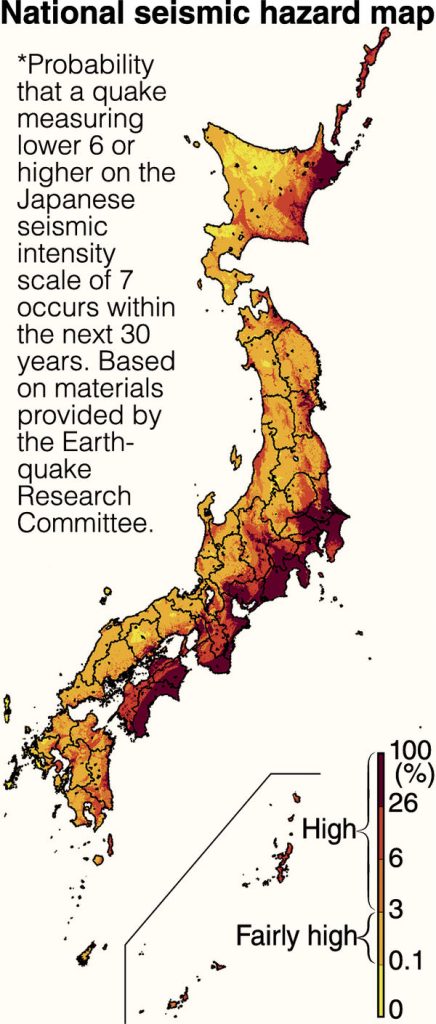The 2018 national seismic hazard map indicates the danger of an earthquake measuring at least lower 6 on the Japanese seismic intensity scale of 7. A review of the scale and probability of a quake occurring in the Chishima Trench on the Pacific side of Hokkaido led to the indication of a higher danger level for eastern Hokkaido.
The probability for Kushiro in eastern Hokkaido rose 22 percentage points from the previous map to 69 per cent, while Nemuro saw its figure rise 15 points to 78 per cent. The increases are attributed to the scale and probability of an earthquake occurring in the Chishima Trench, which were revised last year.
By prefectural capitals, Chiba topped the list with 85 per cent as concerns have grown about a quake directly hitting the Tokyo metropolitan area. It was followed by Yokohama with 82 per cent and Mito with 81 per cent. The probability for Tokyo was 48 per cent, as the ground in areas near the Tokyo metropolitan government building is relatively firm.
Coastal areas saw seismic probabilities exceeding 80 per cent. Among focal areas along the Nankai Trough, the probability for Kochi rose one point from the previous map to 75 per cent. Shizuoka also rose one point to 70 per cent. Osaka, which was struck by a magnitude-6.1 quake registering a maximum of lower 6 on June 18, saw its probability remain the same as the previous map at 56 percent. The Earthquake Research Committee said Osaka is likely to continue facing a high probability.

The government’s Earthquake Research Committee has released the map, which is based on data as of January 1 this year. Probabilities were estimated on the assumption that a magnitude-6-level quake could occur anywhere. The hazard map was created based on the history of earthquakes that have occurred on plate boundaries, such as the Nankai Trough on the Pacific side, as well as on major active fault zones and within plates. A quake measuring lower 6 is viewed as a yardstick for destroying structures such as wooden houses with low quake resistance and concrete block walls.
No comments:
Post a Comment